THE POOR OF LONDON
Alexandra Artley explores the streets of King's Cross
and discovers what poverty means for the homeless and for families living in bed-and-breakfast hotels
HIGH frivolity, followed by a spell of inventive gloom, is the way many people learn to live who are vaguely dependent for an income upon Art. Well-established artists and writers often never lose the early habit of blueing it all today because tomorrow something is bound to turn up. It is the belief that something else will happen, can happen (it is called hope), that distinguishes the relatively poor from those emotionally stultified or physically dam- aged by living in genuine and unremitting poverty. For very poor people, the burden of weekly, sometimes dai- ly, existence is borne on the back like a boulder, slowly wearing down the body, spirit and will. Like the very rich, the very poor inhabit a hid- den world requiring an equal degree of sensitive penetration. If you do not really want to know how the poor live they I are not likely to impose themselves upon you. Poor people of every class tend to be rather quiet, inward-looking and easy to dismiss. Occasionally, under the stress of it all, a man or woman in this neighbourhood will explode with mental pain, drunkenness or rage in the street. The veneer of pretence that everyone is a capable adult, competent enough to find a Job, a home, to pay bills, or bring up children with pleasure and dignity is, for a few minutes, uncomfortably revealed as untrue. Then a neighbourhood is forced to admit that things are not as they should be. There are desperate people about. King's Cross is really the northern fringe of Bloomsbury, just ten minutes' walk away from Doughty Street and this maga- zine. It was never a smart area (even before the railways came) but never as poor as Tower Hamlets or Hackney. This is still true today. It is a lovable mixture of late Georgian terraces and squares, dotted with red-brick Edwardian tenement build- ings and Fifties council flats which are now thought to look rather chic.
King's Cross has a history of dealing with large numbers of poor people — in one way or another. By the 1890s, the new St Pancras Workhouse (now the Hospital for Tropical Diseases in Royal College Street) was the largest in London with over 2,000 rate-supported poor. Today King's Cross continues to attract large numbers of poor, proving Charles Booth's repeated observa- tion in Life and Labour of the People of London (1892-7) that 'poverty is caught and held in successive railway loops'.
Many people in the King's Cross area originally came from the North, Scotland, the Irish Republic, Africa, the Indian sub-continent or other London boroughs. Underpinning the transient and newly set- tled population is a pleasing old-fashioned working-class stability in which people know each other and what's what.
Going out with a pram or push-chair is a good way to get to know an area. Unless her pram is spectacularly stylish, the woman behind it is socially invisible. When I went out with my children in the pram seriously looking for signs of modern poverty in an area I thought I knew, I soon became alarmed at just how much there is. A low rate of car ownership is a modern sign of poverty. There are thousands of wheels in King's Cross but not many of them are attached to cars because this is the land of Calcutta Pram Culture. For a woman in King's Cross a pram or push- chair is her car. It conveys her young children, her plastic bags of shopping, takes bundles of dirty washing to the launderette, acts as an outdoor bed for the children and is used by them as a toy. As she may spend many hours waiting in DHSS or housing queues, children are strapped into it just to restrain them. For poor Asian families the push- chair certainly is a car substitute. When a cou- ple are out together, he tends to drive it.
King's Cross has been civicly spruced up in recent years (Camden Council declared it a Community Benefit Area and has also modernised approximately 1,000 council flats and houses) but signs of personal poverty cannot be so easily erased. There is much male and female destitu- tion. It is a shock to see a middle-aged woman wearing decaying sacking, her legs, face and bare arms streaked with greasy filth walking barefoot on a wet street (Gray's Inn Road outside Franchi's DIY shop). Another bare-armed, bare-legged woman is so huge she occupies a whole public bench and is so far beyond the help of any dress shop she wears tartan blankets like a toga (Judd Street). A young un- shaven man with thick wavy black hair very politely asks for money in Euston Road and is one of many destitute men of all ages. Mental and physical disability are another cause of poverty. There is the woman who wrings her hands, runs in circles and cries all the time like a distres- sed child (Marchmont Street). Is this what is meant by 'community care' of the mentally ill? Nearby there is the only one-legged man I have ever seen being drunk and disorderly in a wheel-chair. He spins round and round whirling cider bot- tles above his head, cursing and singing (Brunswick Centre). There are pieces of brown-stained paper on which people who have slept rough have wiped their bottoms (everywhere); endless wine or cider bottles swigged from and then peed in for a joke; thin dogs tied to push-chairs with bits of string. Old age is another prime cause of poverty. An old woman shuffling along the street (Marchmont) wears fluffy slippers, a nightdress and a coat over the top. Other old women never bathe and leave a pun- gent trail of rotten fish behind them (Safeway's supermarket).
Sometimes in this area I have witnessed spectacular public quarrels— a man hitting a woman so hard in the face that she lies literally full length in the gutter, when he then bursts into tears and helps her up (St Chad's Street). There is a travellers' en- campment of rickety caravans (just off King's Cross Road) and the long, dispirited queue of perhaps 50 people outside the DHSS office in Tavistock Place, some with children in push-chairs. Asian women al- ways look cold. In the November rain, a long nylon sari, worn under an imitation suede coat, is a reminder of how bedrag- gled long skirts must have looked in poor areas in every century but our own.
Just inside the door of the Homeless Persons Unit in Instrument House (King's Cross Road) I saw an utterly pitiable sight. Beside a pram was a woman in her late twenties who looked more like 50. Her teeth were totally black and decayed top and bottom, she had an infection of some kind in both eyes and was stockingless on a wet, though mild November day. In the pram on a dirty khaki-coloured blanket of institutional origin (perhaps army) sat a silent red-haired boy of two and flat on her back a very dirty baby girl of under a year. A bottle was stuck in her mouth on which she seemed to be silently choking. A rivulet of milk ran from her mouth into her right ear. The woman was waiting for her brother and sister-in-law (whose children they were), and was too timid to go into the waiting-room. She said she came from Waterford City.
Earlier this autumn, I was out with the pram when a young woman who turned out to be Glaswegian reeled and staggered in front of me and was sick by the side of the
pram in the street, spattering the wheels. She then hung on to a lamp-post and was sick again. She apologised for doing it in front of the children (`the wains') but she was pregnant and had been drinking. A pregnant girl reeling drunk in the street at 11.30 in the morning. This was in Whid- born Street and, as I later noticed when looking at Charles Booth's poverty map of London, this street in 1885 was coloured black as Booth's category `A' — 'distress' or the terrifyingly named 'residuum'. Charles Booth was a rich businessman, abnormally tall and thin, whose clothes hung on him 'as if on pegs'. Watching him nibble a dry biscuit or pick at a potato with his fork, his cousin Beatrice Potter (latter Webb) wrote that 'his striking unconven- tionality betokens an irritating brain or a futile eccentricity'. Booth spent 17 years of his life literally mapping house by house (in Tower Hamlets) and then street by street the conditions under which Londoners lived. He classified them in a scale ascend- ing from the deepest distress (black bits on the map) to the very wealthy (yellow). At the end of his survey, he estimated that 30 per cent of Londoners lived in poverty and 70 per cent in comfort. 'Mr Booth's 30 per cent' was not very good news for humanita- rians, but something of a relief to those who feared social revolution.
For our own day, I think there is a great deal to be looked at in Booth again. By investigating dispassionately he was able to penetrate beyond the vulgar idea that poverty is always the result of 'idleness and vice'. He saw that the poor fell (and still fall) into many differing categories. You can be poor because of employment (lack of it or low wages), your circumstances (sickness, old age or a big family) or hopeless habits (idleness, irrationality). People in the first two categories often make heroic efforts to help themselves. As for the third, Booth did a great service in freely recognising that there will always be a group of people in society who cannot look after themselves, which contradicts conventional modern wisdom. Poverty engenders a strange mixture of conflicting emotions. I felt shock and alarm when I first saw particularly appalling situations, pity (the thin version of compas- sion), guilt, a sense of uselessness, patriotic shame, irritation (at irrational and feckless behaviour), a flicker of cruelty (the first human defence when faced with utter powerlessness) and, in the end, respect, because very poor people draw you closer with a beguiling purity. I suppose they represent human truth. Unable to confuse respectability with morality they live by whatever means they can. You know the face of poverty when you see it, but defining it officially for ameliorative purposes will always be one of the great humanitarian problems. In Bri- tain there is no official definition of pover- ty, but the poverty line (invented by Booth) is taken to be the level of Sup- plementary Benefit. This is £48.40 per week for a couple, plus £10.20 per week for a child under ten, or £15.30 per week for a child aged 11-15. Putting it another way, two people live for a week on the price of a metre of chintz.
If Booth were standing with one of his famous notebooks in King's Cross today, he would see that the slums of the Eighties are the innumerable B&Bs (the bed-and- breakfast hotels). Camden now has over 1,000 priority homeless families living in B&B because of the acute shortage of council or other affordable rented housing. A figure of 2,000 homeless families is predicted by the end of 1987.
Hotel homelessness', very clearly visi- ble in King's Cross, is not just a London problem. In the past 12 months, the use of B&B by non-metropolitan authorities also increased by 47 per cent. On top of that, there are over 7,000 single people in Camden living in B&B. People needing four-bedroom accommodation (often Ben- gali families) usually wait for three years in temporary accommodation. This means that many children never know their own home from birth until almost school age. Smaller families and single people usually wait for a year.
Hotels are associated with pleasure or holidays, but bringing up children in one or two squalid rooms in a King's Cross hotel is a nightmare. There is such pressure for emergency accommodation that if Camden rejects a hotel on public-health grounds other boroughs with lower standards simp- ly move people in. In a ground-floor hotel room in Argyle Street, 500 yards from our front door, I found a couple from Hackney with their ten-month son. They had been there four months and the woman was clearly desperate. A double bed was stack- ed with old clothes, its stale sheets pulled back to reveal a pink mattress with wavy stains. Perhaps because she was so depress- ed, the heavy curtains were three-quarters drawn at midday and the room was lit by a weak bulb inside an ancient paper shade.
The place looked blitzed through lack of space or proper facilities. Every surface was littered with bottles of medicine, parti- cularly Sudafed (a paediatric medicine for relieving nasal or sinus congestion), opened loaves of sliced bread, tins of dried milk, hair-curlers, coffee jars, hair-spray and an egg-box. Under a useless-looking handbasin about 18 inches across was a pedal bin for rubbish, a child's yellow plastic potty and a plastic bucket with a lid for soaking soiled nappies.
A second single bed was used as a shelf to store luggage, old newspapers, the baby's changing mat and stacks of the husband's books, files and folders (he is a student). For some reason a sellotape dispenser was stuck half way up the wall. Beneath a shower head which wasn't plumbed in to anything was a table full of vacuum flasks, a few crockery plates and cups, take-away boxes, a bottle of bleach and washing-up liquid. The matted dark- brown carpet was covered with crumbs and food bits (anyone who has ever weaned a baby knows how food hits the deck). Crammed in between all this was a high chair and a lobster-pot'-style play-pen in which the baby stood while she gave him a bite out of a jam doughnut. Behind the play-pen was an iron and a sack of some- thing I thought was cat litter but turned out to be ground rice. A baby-walker (a wheeled device in use since Elizabethan times to help babies zoom about) was rammed on top of a wardrobe and looked likely to fall off. I am describing this room in detail because it is typical of the way many thousands of children are being brought up all over Britain today. The mother had just been told that her baby was losing weight and that his respiratory trouble had still not cleared up. 'The doctor told me to put him on more food I had prepared myself but there's nowhere to cook it.' She gives him a banana mashed with Weetabix in the morning and uses jars of bought baby food after that. As the shared bathroom in the hotel is very cold now, she baths him by standing him upright in the enamel bucket. I asked her what she ate if should couldn't cook. 'Wimpy, Wimpy, Wimpy and chick- en and chips.' Medicine rather than sociology seems destined to fuel the social conscience of the Nineties. The deteriorating health of chil- dren and adults living in hotels is now such a national problem that a special interest group for homelessness was formed within the Health Visitors Association in Septem- ber 1985. A recent report by the HVA on the health of hotel children makes sober reading. Hotel children are more vulner- able to accidents (scalds, burns and falls) and to disease. They suffer more from vomiting (because of eating ghastly take- aways), chest complaints (from condensa- tion) and scabies. Preventive medicine programmes are hard to maintain and over half the under-fives in the survey had not been immunised against diphtheria or polio. Their development is retarded be- cause of lack of play facilities or even space to learn to walk. To keep them safe they are strapped into push-chairs more than they would be in an ordinary home (the strapping-down of poor children to keep them safe was first noted by Mrs Pember Reeve in 1913 in her study, Round About a Pound a Week). Hotel children frequently sleep in rooms full of cigarette smoke or with adults smoking in bed. They walk later, talk later, keep themselves clean later and are often visibly depressed or aggressive.
Even if a child is ill, some mothers will still have to vacate their rooms for a fixed period each day and take the child out in a push-chair. What is poverty if it is not being forced to walk the streets in all weathers with a sick child? On top of all that, some inner-city GPs are under such pressure that they are sometimes unwilling to let homeless families register. Despite excellent efforts by all the medical and social services in this area, the new slum children of King's Cross are already physi- cally noticeable.
Briget Lovell was a health visitor at the Mount Pleasant Hotel. She resigned this year to become a home care sister for the North London Hospice Group. 'I saw a lot of guilt and shame in people who are homeless because they want to do the best for their children like most parents. People who have lived in B&B always remark upon the experience — it has marked them deeply. From a different point of view, I feel that if special services are provided for homeless families, it endorses the situa- tion. It says that if social services are provided it's all right to be homeless, and it's not all right.'
People who are not poor in King's Cross are the hoteliers, of whom Feroz Kassam, a director of Firoka Ltd, is perhaps the richest. Mr Kassam bought the Mount Pleasant Hotel in Calthorpe Street for £4 million three years ago. Now it is Cam- den's Lubianka of the homeless, housing over 350 households including 150 chil- dren. After dark in the Gissing gloom of King's Cross Road, the faulty red letters of its sign read `UNT LEASANT OTEL'. Inside, its public areas have the garish starkness of Sixties tourist hotels in East Germany.
Originally Mount Pleasant was a Row- ton House, a hostel for single homeless men. Its closure for that purpose and conversion into a tourist hotel in the 1970s was a product of the widespread assump- tion that private charity was now unneces- sary as the state would provide. Its current use by priority families is typical of a trend in central London — accommodation for poor single people is being taken off the market to provide emergency housing for the growing numbers of homeless people with children.
Mr Kassam is not a villain, just a sharp businessman who requires scrutiny. In return for a block-booking from local authorities, he gets an approximate income from the DHSS and local authority sources of £65,000 per week. Eighteen months ago he bought the Cora Hotel opposite Euston and in March 1985 sent out a letter to all local authorities saying he would open it for priority homeless.
By December 1985, it was full and his approximate income from public sources is £55,000 per week. Mr Kassam now owns the Ferndale, a smaller hotel on Argyle Square, and in 1985 his brother bought the turquoise-painted Globe (turquoise is al- ways a bad sign) for £1/4m for the same homeless game. Could £5 million per year of public money not be better invested than giving it to Feroz Kassam? Another • hotelier is Bill Tickle. He worked in Camden's Homeless Persons Unit at In- strument House in King's Cross Road. Seeing from within the amount of money to be made from homelessness, he prompt- ly got a government grant (more public money) to set up a hotel company spe- cialising in B&B. It operates in Padding- ton.
As pressure on the Homeless Persons Unit is now so great and people have to wait in rather squalid conditions, yet more public money is about to be spent. A building for the purpose is being refur- bished on Gray's Inn Road at a cost of £420,000, to be ready by October 1987. A zillion new officials are also needed to maintain emergency support services for children in the hotels. Money from every quarter is being thrown away without homeless people being the beneficiaries. The question seems to be not that we need more affordable rented housing (we do), but who politically controls the tenancies. In the meantime, the human cost is incal- culable.
When I am out with the pram, one of the most dispiriting sights in King's Cross is the queue of dirty, hungry, cold people waiting outside the DHSS office in Tavistock Place, now the most over-burdened and incompetent office of its kind in London. This is just around the corner from Jean Rhys's famous `Arkwright Gardens' (Cart- wright Gardens) in After Leaving Mr McKenzie. A lot of people in Tavistock Place seem to have just left Mr McKenzie, and again there are the haunting pale listless children slumped like sacks in push- chairs.
They wait for a very long time indeed. The results of a questionnaire issued to people waiting there in August this year by Camden's Housing Aid Centre confirm what you see. Just over a third of the people waited from seven to nine hours to be seen and just under a third waited over nine hours. My feeling that a lot more people are sleeping rough in King's Cross is confirmed by the fact that 27 per cent of people in the survey had slept in the open the previous night. One in four of those were pregnant girls or single women with children. There is much anecdotal evidence of people with children sleeping outside and Euston Station is said to be the warmest place to go. Bloomsbury Health Authority has just appointed a new GP, Gordon Lippmann (based in Chalton Street) to look after people sleeping in the open, as well as other homeless families.
At the junction of Tavistock Place and Marchmont Street are two buildings which symbolise the modern gulf between rich and poor. On one corner is an estate agent unforgettably named Frank Harris. It sells one-room flats (`studios') to Yuppies for £49,500 each. These flats are in the clone- up Edwardian tenements originally built for Booth's poor. Opposite is the King's Cross Citizen's Advice Bureau, now over- whelmed with enquiries, principally about the breakdown of DHSS payments in the area and the lack of affordable housing. In its annual report, the CAB cited many pathetic cases. One involved a couple in their eighties who did not know they could claim Supplementary Benefit and were being hounded by the LEB for a fuel debt, while living on a reduced joint-retirement Pension of £13.92 per week — the price of a large bottle of whisky. In recent weeks it has been strange to go home in the evening. To open the front door was like passing from one century to another, from chaos into serenity or dark- ness into light. With the inward shudder that all women have when they feel the evil that is done to other people's families, I went down to the kitchen and took my own children in my arms.
Alexandra Artley is Associate Editor of Harpers & Queen.

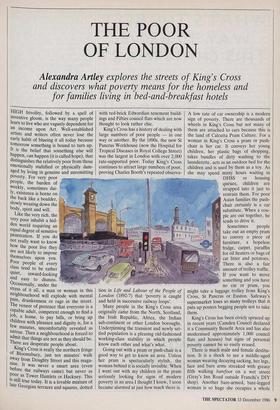
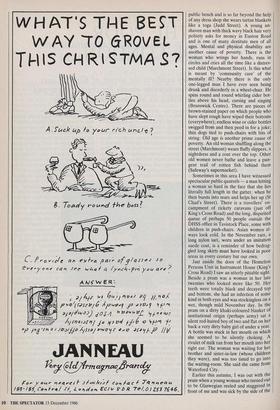
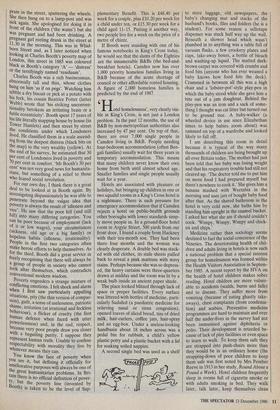
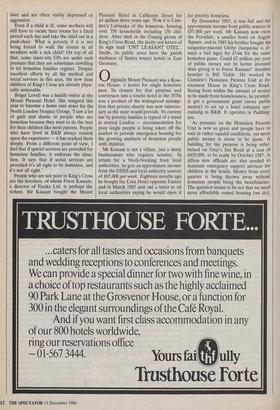
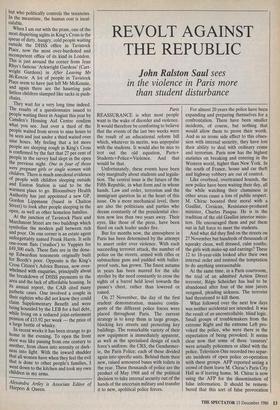
































































 Previous page
Previous page